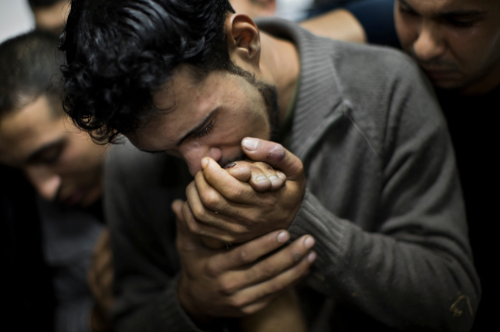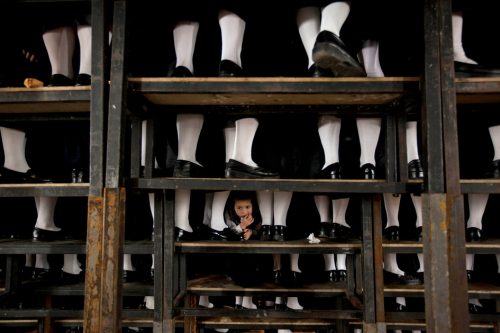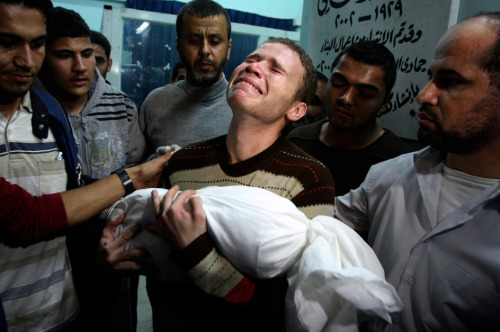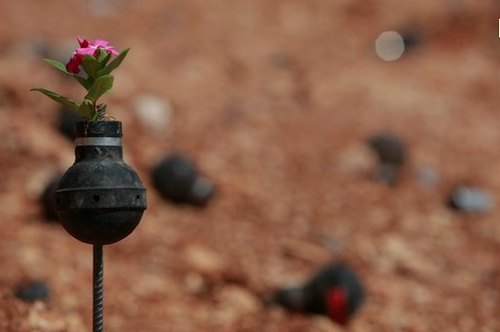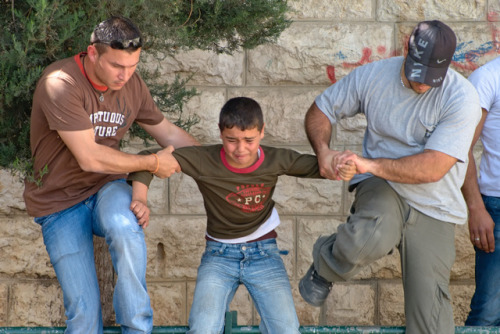#israeli violence
Muki Najaer / PNN Exclusive
Israeli Occupation Force (IOF) uses feces of Israeli residents and settlers as a form of bio-warfare against Palestinian farmers in the villages of Wadi Fuqeen and Nahaleen. Additionally, the Israeli army has developed a large vehicle for spraying sewage waste and feces at Palestinian protestors and homes, reportedly, in the towns of Abu Dis, Aizariah, Bil’in and Nabi Saleh.
Spraying sewage waste has become so common a weapon used by the Israeli Army that the combination of sewage water, feces, and human urine has been named “skunk”. B'Tselem reports that ‘skunk’ and the vehicle used to disperse it, have been added to Israel’s armory for crowd control.
On 3 June of this year, the World Health Organization (WHO) reported that the wild poliovirus type 1 (WPV1) js present in sewage samples collected from Israel. Additionally, human feces contain endless forms of bacterial and biological contaminants. Given this information, the intentional use of sewage waste against Palestinians qualifies as bio-warfare.
Feces as Bio-Warfare Against Farmers
For several days, raw sewage from the illegal settlement of Beitar Illit has been contaminating Palestinian farmers’ fields in the village of Wadi Fuqeen. The effects of the sewage water include damage to crops, permanent poisoning of the land, and the potential of spreading viruses and diseases.
The settlement of Beitar Illit, which was built in 1986, is now illegally occupied by 50,000 Israeli settlers. In 2006 the settlement began to dispose of its wastewater by dumping it on what remains of Wadi Fukin.
As a result, 50-60 dunams (50,000 – 60,000 square meters) of agricultural land is now unusable, olive and almond crops have been ruined, and the spring water is unsafe to drink.
The residents and farmers, who are heavily dependent on fresh spring water and fertile soil, are now forced to purchase water from an Israeli company that steals and resells water from an aquifer located beneath the Palestinian city of Bethlehem.
The Palestinian residents of the neighboring Nahaleen are facing the same indignity and crime against their water, land, and health.
Tragically, Wadi Fuqeen and Nahaleen, which have been suffering these outflows of sewage about twice a week since 2006, are not the only Palestinian villages targeted with Israeli sewage.
Feces as Bio-Warfare Against Regular Citizens and Protestors
Locals in the village of Abu Dis reported on September 25 that Israeli Occupation Force officials drove a large vehicle containing feces around main streets, and sprayed the sewage water ‘everywhere’ and on everything.
Locals reported, “It entered the houses and the kids’ rooms – and it didn’t clear like teargas does. It hung around in the fabric inside houses and made everyone fear for their health.” They added, “Rumors of possible viruses are going around.”
A similar story of intentional sewage spraying is reported to have occurred in the nearby town of Aizariah on September 20. In March of this year, Middle East Monitor reported that Israeli forces sprayed Palestinian homes in the village of Nabi Saleh as a punishment for organizing weekly protests against the Apartheid Wall.
1: Nov. 18, 2012 file photo, a Palestinian man kisses the hand of a dead relative in the morgue of Shifa Hospital in Gaza City. (AP Photo/Bernat Armangue, File)
2: Nov. 17, 2012 file photo, smoke rises during an explosion from an Israeli forces strike in Gaza City. Israel bombarded the Hamas-ruled Gaza Strip with nearly 200 airstrikes widening a blistering assault on Gaza rocket operations by militants to include the prime minister’s headquarters, a police compound and a vast network of smuggling tunnels. (AP Photo/Hatem Moussa, File)
3. In this Tuesday, Feb. 14, 2012 file photo Ultra-Orthodox Jews gather for the traditional Jewish wedding of Chananya Yom Tov Lipa, the great-grandson of the Rabbi of the Wiznitz Hasidic followers, in the ultra-Orthodox town of Bnei Brak near Tel Aviv, Israel. (AP Photo/Oded Balilty, File)
4: Nov. 14, 2012 file photo, Jihad Masharawi weeps while he holds the body of his 11-month old son Ahmad, at Shifa hospital following an Israeli air strike on their family house, in Gaza City. The Israeli military said its assassination of the Hamas military commander Ahmed Jabari, marks the beginning of an operation against Gaza militants. (AP Photo/Majed Hamdan, File)
Post link
BILIN, West Bank (AP) — Residents of this Palestinian village have planted flowers in hundreds of spent Israeli tear gas grenades to honor those killed during their weekly protests against Israel’s West Bank separation barrier.
Mohammed Khatib, a village organizer, said Wednesday that the unusual garden is meant to show that life can spring from death.
Bilin has become a symbol of Palestinian protests against Israeli policies in the West Bank. The village’s struggle to regain land taken by the barrier was the subject of “Five Broken Cameras,” a documentary nominated for an Oscar last year.
Palestinians say the barrier, which cuts into the West Bank, amounts to a land grab. Israel says it’s needed to keep Palestinian attackers out.
The Bilin garden commemorates Bassem Abu Rahmeh, a protest leader who was killed in 2009 when a tear gas grenade struck him in the chest during a demonstration. Bassem’s sister, Jawaher, died nearly two years later, a day after a weekly protest during which villagers said she inhaled Israeli tear gas.
During West Bank protests, Israeli troops often fire tear gas, stun grenades, rubber bullets and occasionally live rounds, portraying them as appropriate means against Palestinian stone throwers.
Post link
This morning, 01 October 2013, Israeli soldiers fired four stun grenades and two tear gas canisters at children on their way to school in Khalil (Hebron). The video, taken by internationals present, shows Israeli forces firing two tear gas canisters and one stun grenade.
Muki Najaer / PNN Exclusive
The Israeli state’s leniencies towards its citizens who commit racist hate crimes is so pervasive and comprehensive, it begs the question: does the Israeli government covertly hope to assure the continuation of racist crimes against Palestinians?
While all Palestinians are tried in military court, Israeli’s receive the privilege of trials in the civilian court system. Additionally, illegal settlers living in the occupied West Bank are granted the legal liberties of the Israeli judicial system, while Palestinians living in the same area legally, are not. Apart from the blatant unequal treatment of people with different nationalities, this system violates the principle of territoriality, according to which a single system of law must apply to all persons living in the same territory.
The Israeli police and occupation force arrest Palestinian children for the simple purpose of instilling fear into their communities and criminalizing them, but allow Israeli adults who commit racist hate crimes to go unpunished. Those committing the hate crimes are not the only racist force at play: the Israeli Police and the Israeli Occupation Force play a paramount role in systemically encouraging hate crimes against Palestinians, and maintaining dis-symmetry in the racial and power dynamics of the legal system that deals with Israelis and Palestinians.
Following a pattern of ongoing hate crimes against Palestinians, four young Israeli extremists invaded a Christian Cemetery in the occupied Jerusalem and defaced 15 gravestones in the Evangelical Lutheran Cemetery, in the King David Tomb, on Sunday September 29.
The four criminals, who were caught by Israeli Police personnel, are students of a Jewish Yeshiva, and range from 17 – 26 years of age. Two of the four fanatics, were previously caught by the police for hate crimes against Palestinians. The same two individuals belong to an extremist group of Israeli settlers, the Hilltop Youth Movement, an organization known for its deep seeded racism and numerous attacks against Palestinian lands and property.
The Israeli state’s leniencies towards its citizens who commit racist hate crimes is so pervasive and comprehensive, it begs the question: does the Israeli government covertly hope to assure the continuation of racist crimes against Palestinians?
Israel Turns a Blind Eye to its Citizens’ Racist Crimes
B’Tselem, an Israeli Information Center for Human Rights in the Occupied Territories, released a report in 2011 indicating that Israeli Police, the entity responsible for investigating settler violence and hate crimes against Palestinians, do not properly examine claims of violence, nor do they enforce punishment based on Israel penal law.
From September 2000 to the end of 2011, B'Tselem submitted 352 complaints to the Israeli Police, demanding to know if investigations had been opened in cases ranging from gunfire, assault, destruction of property, forcing people off their land, threats, evictions, theft of crops, and torching of fields.
Of the 352 racially charged hate crimes, only 29 resulted in an indictment. 137 files were closed with no measures being taken against anyone involved. In 80 cases, the police did not open an investigation, primarily because the person injured did not file a formal complaint, though the police are required by law to investigate every time they hear of a suspected crime. In 16 cases, B'Tselem received no response, one case was still being processed and in five cases, the authorities claimed that the file could not be located.
De-criminalization of Israelis & Criminalization of Palestinians
B’Tselem’s report sheds light on a pattern of Israeli hate crimes against Palestinians going unpunished, time and time again. Their lack of investigations into violence could simply indicate the Israeli state’s disregard for crime– if it weren’t for the simultaneous criminalization of Palestinians.
Israeli Occupation Force officers perform nightly raids on Palestinians towns and refugee camps, arresting young men and children as young as eleven years old. The arrests occur randomly, and for no apparent reason, forcing local Palestinians to live in a constant state of fear, even in the dead of night, when they are in the supposed safety of their own homes.
A United Nations Children’s Fund (UNICEF) report published in March 2013, states “For some of the children what follows [the arrest] is a chaotic and frightening scene, in which furniture and windows are broken, accusations and verbal threats are shouted, and family members are forced to stand outside in their nightclothes as the accused child is forcibly removed from the home.” The report goes on to state that confessions are obtained from children through the use of intimidation, threats, and physical violence.
The same report states that an average of two Palestinian children are arrested each day, and 700 children ages 12 to 17 are arrested, interrogated, and detained by Israeli army, police, and security agents each year. According to Israeli law, Palestinian children may be held in prison for four days without charges, and can be tried as adults starting at the age of 16. Israeli children, on the other hand, are not tried as adults until the age of 18.
While all Palestinians are tried in military court, Israeli’s receive the privilege of trials in the civilian court system. Additionally, illegal settlers living in the occupied West Bank are granted the legal liberties of the Israeli judicial system, while Palestinians living in the same area legally, are not. Apart from the blatant unequal treatment of people with different nationalities, this system violates the principle of territoriality, according to which a single system of law must apply to all persons living in the same territory.
The Israeli police and occupation force arrest Palestinian children for the simple purpose of instilling fear into their communities and criminalizing them, but allow Israeli adults who commit racist hate crimes to go unpunished. Those committing the hate crimes are not the only racist force at play: the Israeli Police and the Israeli Occupation Force play a paramount role in systemically encouraging hate crimes against Palestinians, and maintaining dis-symmetry in the racial and power dynamics of the legal system that deals with Israelis and Palestinians.
Recent Hate Crimes
The Middle East Media Center reports the following list of recent racial hate crimes committed by Israelis:
On Monday, the Police apprehended two Israeli teenagers, 14 and 16 years of age, on suspicion of being involved in defacing and damaging eight Palestinian cars, near Nabi Saleh Graveyard, in the occupied Jerusalem.
Earlier this week Israelis punctured the tires of 28 Palestinian cars, and wrote racist graffiti in Abu Ghosh. ’Price Tag’ graffiti was also found on the outer walls of a church in the Old City of Jerusalem.
Last month, a Christian Monastery located in the Deir Jamal area between Jerusalem and Ramallah, was attacked by a Molotov cocktail. Racist graffiti, used by Price Tag extremist Israeli groups, was found on its exterior walls.
In mid-June, a number of extremist settlers wrote racist graffiti on some graves at the Christian Greek Orthodox graveyard in Jaffa.
On Friday June 14 Israeli extremists set ablaze two Palestinian cars in Sheikh Jarrah neighborhood, in occupied East Jerusalem, and spray painted racist graffiti. The extremists also wrote racist graffiti on some graves in the Christian Greek Orthodox graveyard in Jaffa and drew the Star of David on a number of graves.
Extremists vandalized the wall of the home Khaled Kaboub, an Arab District Court Judge in Tel Aviv, with graffiti.
There have been hundreds of similar attacks, that included burning and attempting to burn Churches and Mosques throughout Palestine. In addition to numerous attacks targeting both Islamic and Christian graveyards and places of worship, settlers uproot and burn hundreds of Palestinian trees and flood farmlands with waste-water. Those attacks are part of ongoing violations targeting Palestinians lands and livelihoods.
Muki Najaer / PNN Exclusive
On Friday morning a group of 100 gathered in Beit Jala’s Cremisan valley to pick and sort olives, as Palestinians have done every October for many centuries. Europeans, North Americans, South Americans, and Palestinians gathered to learn about the potential annexation of the land and demonstrate solidarity with Palestinian farmers, who face an uncertain future.
This year, the joy of harvest bears a bitter taste for many Beit Jalaians, who fear it could be their last time harvesting olives from the land. Israel has already annexed 22,000 dunums of Bethlehem and Beit Jala land to build illegal settlements, including Gilo, Har Gilo and Har Homa. Earlier this year, Israel proposed building a wall to separate the illegal settlements from the Cremisan Valley.
In September, the EU missions in Jerusalem and Ramallah issued a statement regarding Israel’s annexation plan, saying they are concerned about the proposed construction of an addiional separation barrier, east of the Green Line, in the Cremisan Valley (Beit Jala).
If this plan goes into affect, the valley will be enclosed by an apartheid wall on three sides, Beit Jalaians will lose 75% of their land, and 58 families will lose access to the farmland they depend on. Aditionally the barrier would separate children from their school at the Salesian convent and negatively affect the Cremisan Monastery, the primary place of worship for many locals.
Israel’s pretext for annexing the Cremisan Valley land is the ‘security’ of Israeli settlers, who live in settlements considered illegal according to international law under the Geneva Convention.
After local famers and politicians spoke about the potential annexation of the land, a group of Palestinians broke 2 meter barbed-wire barrier, previously prohibiting Beit Jalaians from accessing their lands. One woman told PNN, “My family has 7 dunums of land just past the barrier, but we can’t get to it to pick the olives.”
Children as young as a year sorted olives into buckets, beside grandmothers, who sat in the shade of trees, palms full of green and purple olives. Adolescents climbed ladders into tree crowns and younger children distributed water, coffee, falafel, and bread to the workers.
Jesse Gonzalez/PNN Exclusive
“Nonviolent resistance is like a tree: it needs water to grow.” That was the motto behind Saturday’s gathering of Italians and locals in the Bedouin community of Al-Mufaqara, which lies just inside Firing Zone 918, in the South Hebron Hills. Two Italians came to share their experiences participating in nonviolent resistance, and to show solidarity with the resistance of local Palestinians, who are currently fighting for the right to stay on their ancestral land.
Al-Mufaqara, home to some 15 families, is wedged between the Green Line to the south, and a band of illegal settlements to the north. The settlers, most of whom are radically religious, are known to harass children on their way to school and burn Palestinians’ crops. Additionally, the Israeli army continually demolishes homes and other structures in the community. The village’s mosque, which Israeli forces demolished twice, is currently a pile of rubble.
Sara, an Operation Dove volunteer who has been in Al-Mufaqara for over a year, told PNN that the group escorts children to school and provides an international, peacekeeping presence, while supporting Palestinian nonviolent resistance. This resistance, Sara explained, takes the form of daily acts such as re-building demolished structures, continuing to shepherd and attend school despite being attacked, and most importantly, staying on the land.
Sara continued, saying the people of Al-Mufaqara don’t just wish to survive this systemic violence; instead they are fighting to bring electricity and water to the community, part of affirming their presence and their right to thrive on their land.
Operation Dove, which has been working in Al-Mufaqara since 2004, organizes one annual event for the community, in which they invite guests to share their experiences participating in nonviolent resistance. The goal of this initiative, which was started on request of the local Popular Committee, is to “water the tree of nonviolent resistance” that thrives in Al-Mufaqara.
Two men, active during the 1970’s “Years of Lead” conflict in Italy, shared their paths to non-violence. One man was part of the armed resistance, and during one occasion had killed a cohort of Italian police. The other was the son of one of those police officers. While the first spent 30 years in prison with multiple life sentences, the other spent those years with a ‘heart full of hatred,’ as he put it.
Eventually, the prisoner joined a hunger strike advocating for humane conditions in the prison. “When I began to fight in a nonviolent way,” he said, “I no longer felt isolated, and it became possible for me to connect and communicate with people.” That initial step in nonviolent resistance impacted him deeply, and he began to advocate for a cessation of armed struggle. Meanwhile, the man whose father was murdered realized that his wound could not heal while he was still full of hate. Eventually the two men decided to meet one another.
“We are not here to give advice to the Palestinians in their struggle, but simply to share our experiences,” they told PNN through an Operation Dove translator. “We want to testify that it is possible to meet [one’s adversaries] as human beings.”
Al-Mufaqara lies within Area C, which constitutes some 60% of the West Bank and is under complete Israeli military and administrative authority. Firing Zone 918 is a 30 square-mile area within Area C in the South Hebron Hills, which has been illegally declared a “military training zone” by the Israeli regime. The area’s residents were evicted in 1999, however they successfully petitioned the Israeli High Court of Justice, which allowed for their “temporary return.” For over a decade since, the approximately 1000 people in the area have been living with uncertainty of their future and continued harassment by the Israeli military and illegal settlers.
The families of Al-Mafuqara, along with the other residents in Firing Zone 918 will continue to resist Israeli military and settler attempts to displace them or delegitimize their right to continue living on the land their ancestors have farmed and shepherded for over two centuries.
Israeli undercover police arresting a Palestinian boy accused of throwing stones at Israeli soldiers.
(Photos: Lazar Simeonov)
I wonder how these brave individuals sleep at night. You went through all that training, and learning undercover techniques…to arrest children. You must feel so big and strong.
Post link

